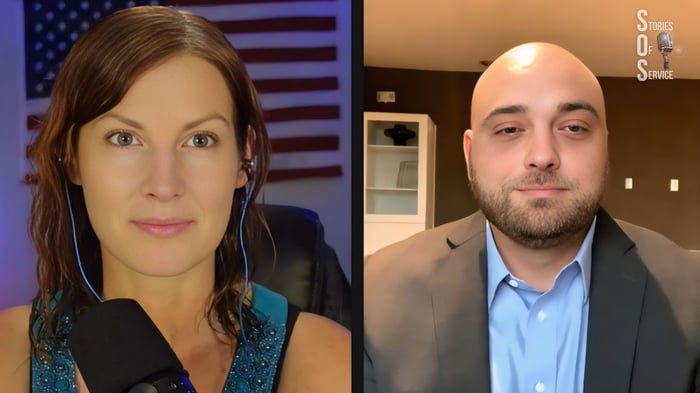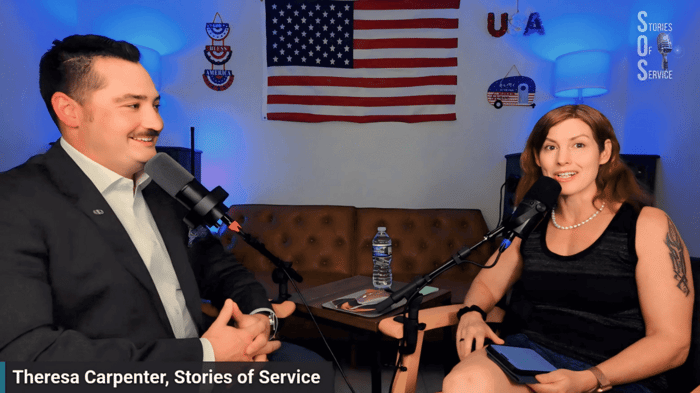In one of the most sobering and revealing episodes of the Stories of Service podcast, host Theresa Carpenter delves into a topic that challenges the very foundation of justice within the U.S. military—false accusations and unlawful command influence (UCI). While the military justice system is designed to uphold honor, integrity, and accountability, systemic flaws can turn it into a source of deep injustice for those falsely accused.
Theresa brings this issue to life through the deeply personal and painful stories of Darin Lopez, a Navy intelligence veteran wrongfully convicted of sexual assault, and Keith Barry, a retired Navy SEAL whose conviction was overturned after a landmark ruling citing unlawful command influence. Together, they shed light on a disturbing period in military legal history and issue a call to action for reform, accountability, and awareness.
Meet the Guest: Darin Lopez

Darin Lopez is a former Navy intelligence specialist who served with distinction for over 12 years. A native of Beaumont, Texas, he joined the military post-9/11 with aspirations of becoming a Navy SEAL, eventually moving into intelligence. Despite a clean record, advanced education, and multiple FBI background checks, Darin was wrongfully convicted of sexual assault—a conviction he argues was driven more by political pressure than by facts. He served three years in confinement and now must live with the stigma of lifelong sex offender registration.
🔑 Key Takeaways:
2. Unlawful Command Influence (UCI) Was Systemic: A recurring theme was UCI—a situation where senior commanders improperly influence judicial proceedings. Lieutenant Colonel Palmer was cited for instructing JAG officers to move forward with cases even when the elements of the crime could not be proven. Admiral Crawford’s affidavit in Keith Barry’s case confirmed that high-ranking officials prioritized institutional image over legal fairness.
3. Due Process Was Compromised: Both men described how traditional safeguards in criminal proceedings were missing or ignored. Darin’s court-martial lasted only half a day, key evidence disappeared, and the burden of proof seemingly shifted to him. Defense attorneys had limited investigative power, and strategic legal decisions—such as not testifying—were later regretted. In Keith’s case, even when evidence pointed to innocence, systemic inertia nearly kept him imprisoned.
4. The Conditions Behind Bars Were Dehumanizing: Darin compared his time in the military brig to the infamous Stanford Prison Experiment, where those in power quickly abused it. Keith described it bluntly: “There was no follow of any type of law there.” Basic rights were neglected, and one psychiatrist even left her position due to the ethical compromises she witnessed.
5. Reform Is Both Urgent and Possible: The guests and Theresa called for comprehensive reform. Darin introduced the idea of the FAIR Act (Falsely Accused Individual Review), a legislative proposal to review cases like his on an individual basis. They highlighted the creation of the Office of Special Trial Counsel as a sign that even the military now recognizes the system’s flaws. Both guests also emphasized the importance of peer support and community-driven advocacy.
Listen to Audio
Watch Full Episode
The Stories of Service podcast is no stranger to hard truths, but this episode cuts especially deep. It forces us to wrestle with a painful paradox: in trying to protect victims of sexual assault—a critical and noble goal—the military justice system may have created new victims in the form of the falsely accused.
Theresa Carpenter refuses to let these stories be ignored. Through raw, unflinching dialogue, she and her guests ask listeners to see the human cost behind broken policies and to take action. Whether by sharing these stories, reading Darin’s book Sailor versus UCI, or advocating for policy changes, everyone can play a part in rebuilding trust and justice within the armed forces.
Injustice doesn’t correct itself. It takes voices, votes, and visibility to make a difference.






